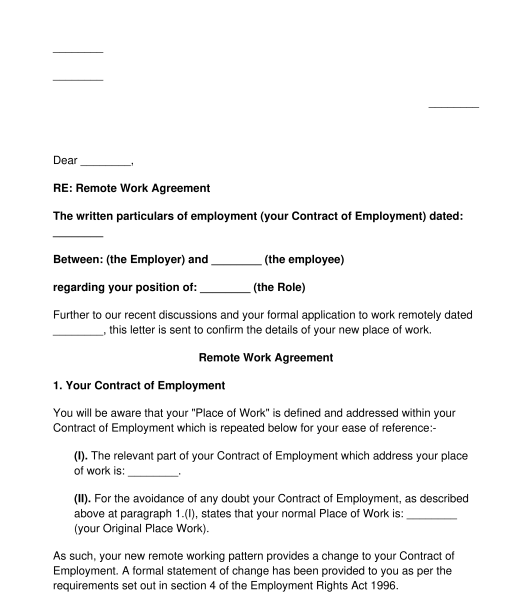 02/11/2025
02/11/2025

Answer a few questions and your document is created automatically.

Your document is ready! You will receive it in Word and PDF formats. You will be able to modify it.

 02/11/2025
02/11/2025
 Word and PDF
Word and PDF
 4 to 5 pages
4 to 5 pages
A remote work agreement is an agreement that is used by an employer to set out the terms and conditions under which an employee will be permitted to work remotely. Remote work means that the employee is allowed to do their job from somewhere else other than the office (e.g. the employee's home, a coworking space, a cafe etc).
For example, an IT technician in a company may be granted the right to work remotelyand they will be required to sign a remote work agreement to show that they understand the conditions attached to their ability to work remotely and that they agree to those conditions.
No, strictly speaking, it is not mandatory to have one. This is because the employer has no right to compel the employee to work remotely. However, if the employee will be permitted to work remotely or if the employer is making a change to the employee's working conditions to allow for remote working, then it is highly recommended to have a remote work arrangement. The remote work agreement will give clear guidelines on how the remote work arrangement should be, and set clear expectations of what is required of the employee.
Before a remote work agreement is implemented, the employee should have submitted a flexible working request to their employer. The request will make it clear why the employee needs to work remotely and from when.
Where the remote work arrangement is initiated by the employer, the employer must have given the employee prior notice of why the remote work is being implemented. Similarly, the employment contract should either allow for this or be updated to reflect this change to the working conditions.
A remote work agreement should only be given to an employee within the organisation. This means that independent contractors (i.e. personnel working under consultancy agreements, service agreements or freeland agreements) do not need to be given remote work agreement. The contract between the independent contractor and the employer is what will govern how the contractor does their designated task.
The employer can also be any form of business structure such as a sole trader, a general partnership, an LLP or a limited company.
The duration of the remote work agreement depends on needs of the employer or employee. It can be indefinite throughout the length of the employee's employment, or for a specific period of time.
Once the remote work agreement has been drafted, it should be signed by both parties (i.e. the employer and the employee). Where the employer is a company, it should be signed by an authorised personnel (e.g. HR Manager). The employer can give a physical copy to the employee or sent it to their email address for their records. The employer should also keep a copy on file for themselves.
The employee's flexible working request can be attached to the remote work agreement.
The employment agreement can also be attached to the remote work agreement.
The employer's work from home policy can also be attached to the remote work agreement.
No, it is not necessary to have witness for a remote work agreement.
A remote work agreement must contain:
The key piece of law which is relevant to remote working in England, Wales and Scotland is the Employment Rights Act 1996.
The key piece of law which is relevant to remote working in Northern Ireland is the Employment Rights (Northern Ireland) Order 1996
You fill out a form. The document is created before your eyes as you respond to the questions.
At the end, you receive it in Word and PDF formats. You can modify it and reuse it.
Guides to help you
Remote Work Agreement - Sample, template - Word and PDF
Country: United Kingdom